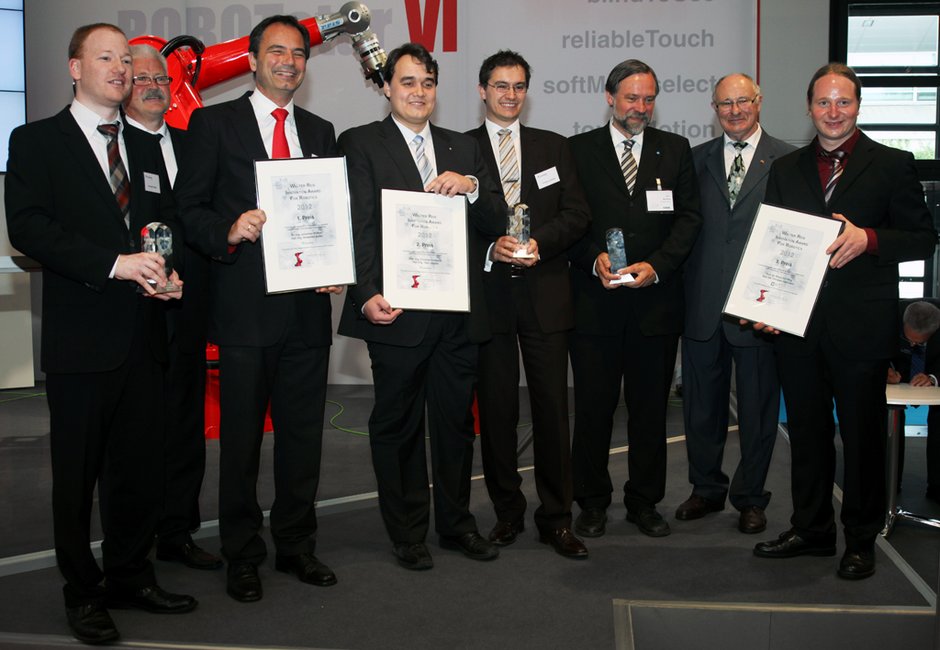Since 2006, Walter Reis, founder of Reis Robotics, every two years presents the Walter Reis Innovation Award for Robotics at the AUTOMATICA International Trade Fair. This prestigious award for developments in the field of robot technology includes prize money of 5.000 € in total. With this innovation award for robot technology, Walter Reis intends to recognize and appreciate outstanding installations and new developments in the field of automation technology.
The applications from Germany, and also from several other European countries, were rated by the renowned jury, consisting of Hubert Waltl (member of brand management board for production and logistics of Volkswagen PKW, VW group, Wolfsburg), Heinz Dieter Schunk (owner of Schunk GmbH in Lauffen), Prof. Dr. Rolf Dieter Schraft (former director of the Fraunhofer Institute for production technology and automation IPA in Stuttgart), Prof. Dr.-Ing. Friedrich Behr (formerly LIZA, Thyssen Krupp Steel AG/Thyssen Automotive, Bochum), and Dr. Eberhard Kroth (general manager of the Reis Group Holding GmbH & Co. KG, Obernburg). This is the fourth year in a row that this very same elite group formed the selection jury.
The Walter Reis Innovation Award for Robotics is awarded for outstanding developments both for robot applications in industrial production processes and for developments in the field of service robotics in the industrial environment, and for innovations in the range of kinematics, controls, and drive systems.
This year the jury decided to award the first prize to Dr. Johannes Wößner and Alexander Spiller from the Fraunhofer Institute for production technology and automation (IPA) in Stuttgart. Dr. Wößner and his development team developed a robot system that for the very first time permits welding of standardized steel components in an arbitrary variety of versions on a robot system with fully automatic generation of the robot programs.
An important approach was extraction of the basic information for program generation directly from the CAD data. The CAD system was further developed so that after termination of design work, all information relevant for the welding task is generated automatically. The programs are allocated so that two robots can execute the welding tasks simultaneously on components with a length of up to 15 m. Of course, there is a dynamic distribution of the work contents to the two robots in such way that an optimum cycle time is achieved. The occurring tolerances are eliminated by the use of laser scanners.
The total system developed by the Fraunhofer Institute can automatically execute a production step with high product quality and high productivity that was previously performed largely manually.
The competence at the Fraunhofer Institute for production technology and automation in the field of robot systems becomes apparent from the fact that the jury awarded the second place of this year's Walter Reis Innovation Award to the Institute in Stuttgart, as well. Christian Connette and Theo Jacobs developed a modular, omni-directional chassis for mobile robots in the industrial environment which they presented to the jury.
Due to the use of mobile service robots in close cooperation with humans a considerable increase in productivity and quality can be achieved. Typical applications for mobile systems in the environment of manual work stations, however, are often narrow and angled. The Fraunhofer modular chassis meets these requirements with close interaction of mechatronic and technical control concept and due to the kinematic design. Using a hub drive and a very integrated design, the drive module developed by the IPA is much smaller than presently common systems. The small size allows assembly of compact mobile platforms, which have advantages in maneuverability and flexibility in narrow environments. The mobile chassis is able to transport a total weight of up to 250 kg with speeds of up to 1,5 m per second with slopes of up to 10 degrees.
Another advantage is the modularity of the design. The controller for the drive motor arranged inside the chassis allows easy integration into many platforms, requiring only the energy supply and CANbus to be available. For this work the development team of the Fraunhofer Institute received prize money of 1.500 €.
The third prize for this year's Walter Reis Innovation Award goes to Prof. Klaus Schilling and Christian Herrmann from the University of Würzburg, chair in informatics VII: Robotics and telematics. Their work on the topic “Real-time Control for Robotic Movement Compensation” is based on radiation medicine. To irradiate a lung tumor very precisely despite the patient's respiration, it is necessary to acquire and to compensate the motion of the tumor tissue. The developed predictive regulatory approach for a robot that moves in space while the patient is positioned on a bed, compensates for the tumor motions in real time. Thus, the stationary installed irradiation unit will always hit the tumor with reliable precision and leave the adjacent, sound tissue unimpaired. The irradiation dose thus can be adapted more efficiently and the treatment can be executed with higher efficiency. This approach developed in common by the industry and irradiation doctors has already proved its performance in a demonstration in the hospital. The approach developed by Prof. Schilling allowed a much more efficient application of the hard irradiation in the therapy and brings significant progress in the therapeutic radiology.
The prizes were handed over to the three development teams by Walter Reis in person in the Reis Robotics exhibition booth at the Automatica in Munich.
×


